width YAMAHA YZ250F 2010 Owners Manual
[x] Cancel search | Manufacturer: YAMAHA, Model Year: 2010, Model line: YZ250F, Model: YAMAHA YZ250F 2010Pages: 196, PDF Size: 13.74 MB
Page 27 of 196
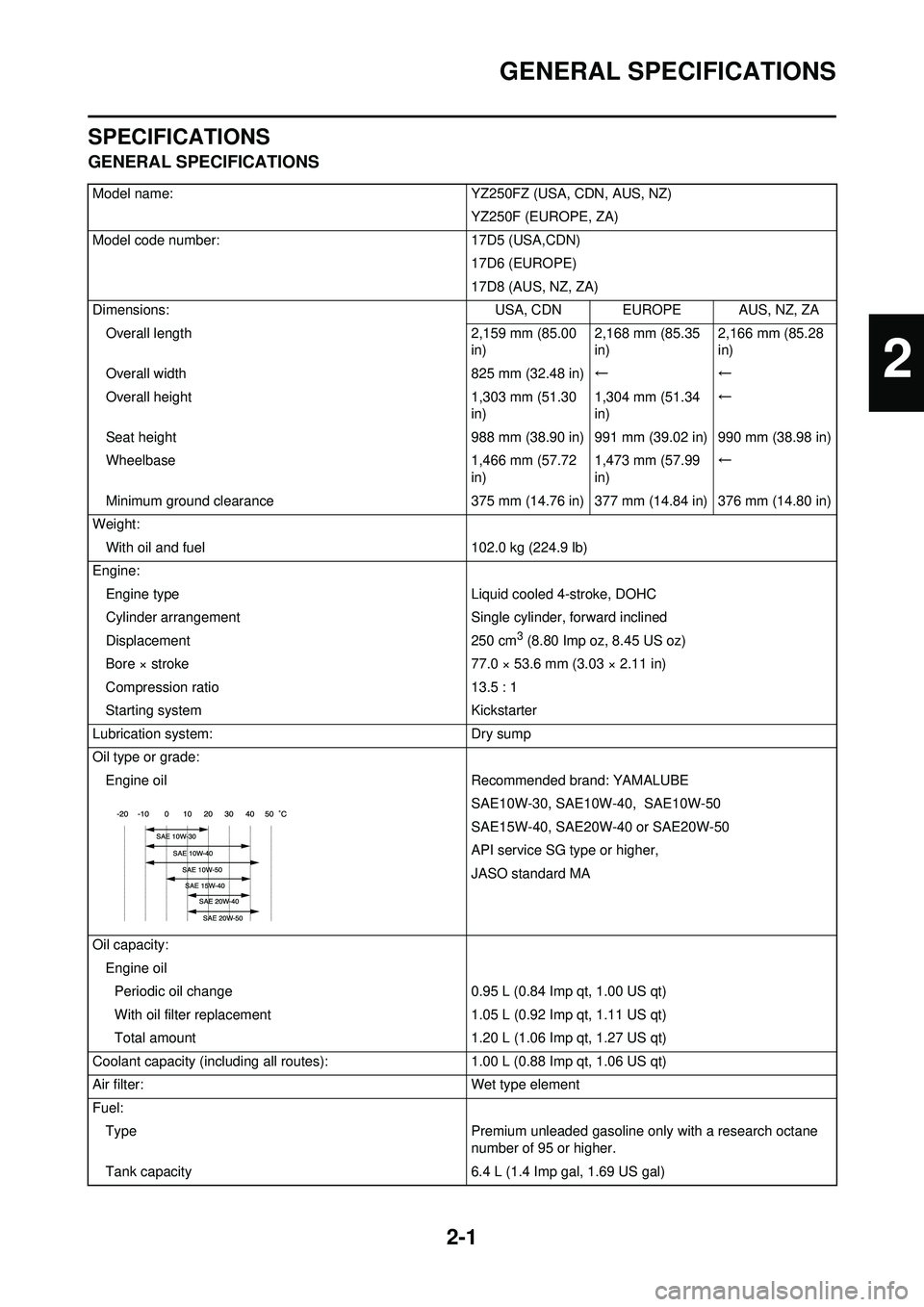
2-1
GENERAL SPECIFICATIONS
SPECIFICATIONS
GENERAL SPECIFICATIONS
Model name:YZ250FZ (USA, CDN, AUS, NZ)
YZ250F (EUROPE, ZA)
Model code number: 17D5 (USA,CDN)
17D6 (EUROPE)
17D8 (AUS, NZ, ZA)
Dimensions: USA, CDN EUROPE AUS, NZ, ZA
Overall length 2,159 mm (85.00
in) 2,168 mm (85.35
in)2,166 mm (85.28
in)
Overall width 825 mm (32.48 in)←←
Overall height 1,303 mm (51.30
in) 1,304 mm (51.34
in)←
Seat height 988 mm (38.90 in) 991 mm (39.02 in) 990 mm (38.98 in)
Wheelbase 1,466 mm (57.72
in) 1,473 mm (57.99
in)←
Minimum ground clearance 375 mm (14.76 in) 377 mm (14.84 in) 376 mm (14.80 in)
Weight: With oil and fuel 102.0 kg (224.9 lb)
Engine: Engine type Liquid cooled 4-stroke, DOHC
Cylinder arrangement Single cylinder, forward inclined
Displacement 250 cm
3 (8.80 Imp oz, 8.45 US oz)
Bore × stroke 77.0 × 53.6 mm (3.03 × 2.11 in)
Compression ratio 13.5 : 1
Starting system Kickstarter
Lubrication system: Dry sump
Oil type or grade: Engine oil Recommended brand: YAMALUBE
SAE10W-30, SAE10W-40, SAE10W-50
SAE15W-40, SAE20W-40 or SAE20W-50
API service SG type or higher,
JASO standard MA
Oil capacity: Engine oilPeriodic oil change 0.95 L (0.84 Imp qt, 1.00 US qt)
With oil filter replacement 1.05 L (0.92 Imp qt, 1.11 US qt)
Total amount 1.20 L (1.06 Imp qt, 1.27 US qt)
Coolant capacity (including all routes): 1.00 L (0.88 Imp qt, 1.06 US qt)
Air filter: Wet type element
Fuel: Type Premium unleaded gasoline only with a research octane
number of 95 or higher.
Tank capacity 6.4 L (1.4 Imp gal, 1.69 US gal)
2
Page 30 of 196
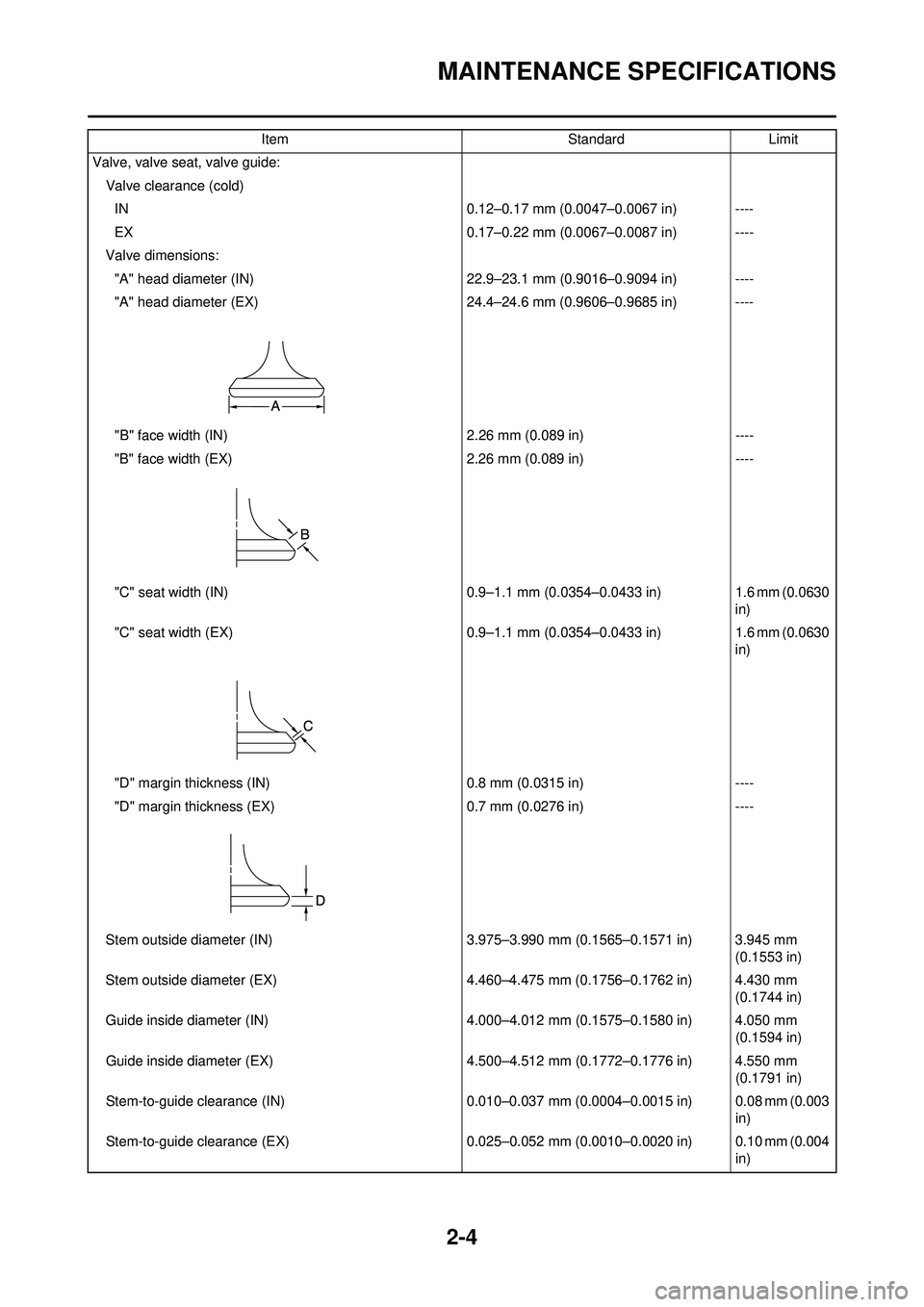
2-4
MAINTENANCE SPECIFICATIONS
Valve, valve seat, valve guide:Valve clearance (cold)IN 0.12–0.17 mm (0.0047–0.0067 in) ----
EX 0.17–0.22 mm (0.0067–0.0087 in) ----
Valve dimensions: "A" head diameter (IN) 22.9–23.1 mm (0.9016–0.9094 in) ----
"A" head diameter (EX) 24.4–24.6 mm (0.9606–0.9685 in) ----
"B" face width (IN) 2.26 mm (0.089 in)----
"B" face width (EX) 2.26 mm (0.089 in)----
"C" seat width (IN) 0.9–1.1 mm (0.0354–0.0433 in)1.6 mm (0.0630
in)
"C" seat width (EX) 0.9–1.1 mm (0.0354–0.0433 in)1.6 mm (0.0630
in)
"D" margin thickness (IN) 0.8 mm (0.0315 in)----
"D" margin thickness (EX) 0.7 mm (0.0276 in)----
Stem outside diameter (IN) 3.975–3.990 mm (0.1565–0.1571 in) 3.945 mm
(0.1553 in)
Stem outside diameter (EX) 4.460–4.475 mm (0.1756–0.1762 in) 4.430 mm
(0.1744 in)
Guide inside diameter (IN) 4.000–4.012 mm (0.1575–0.1580 in) 4.050 mm
(0.1594 in)
Guide inside diameter (EX) 4.500–4.512 mm (0.1772–0.1776 in) 4.550 mm
(0.1791 in)
Stem-to-guide clearance (I N) 0.010–0.037 mm (0.0004–0.0015 in) 0.08 mm (0.003
in)
Stem-to-guide clearance (E X) 0.025–0.052 mm (0.0010–0.0020 in) 0.10 mm (0.004
in)
Item
StandardLimit
Page 31 of 196
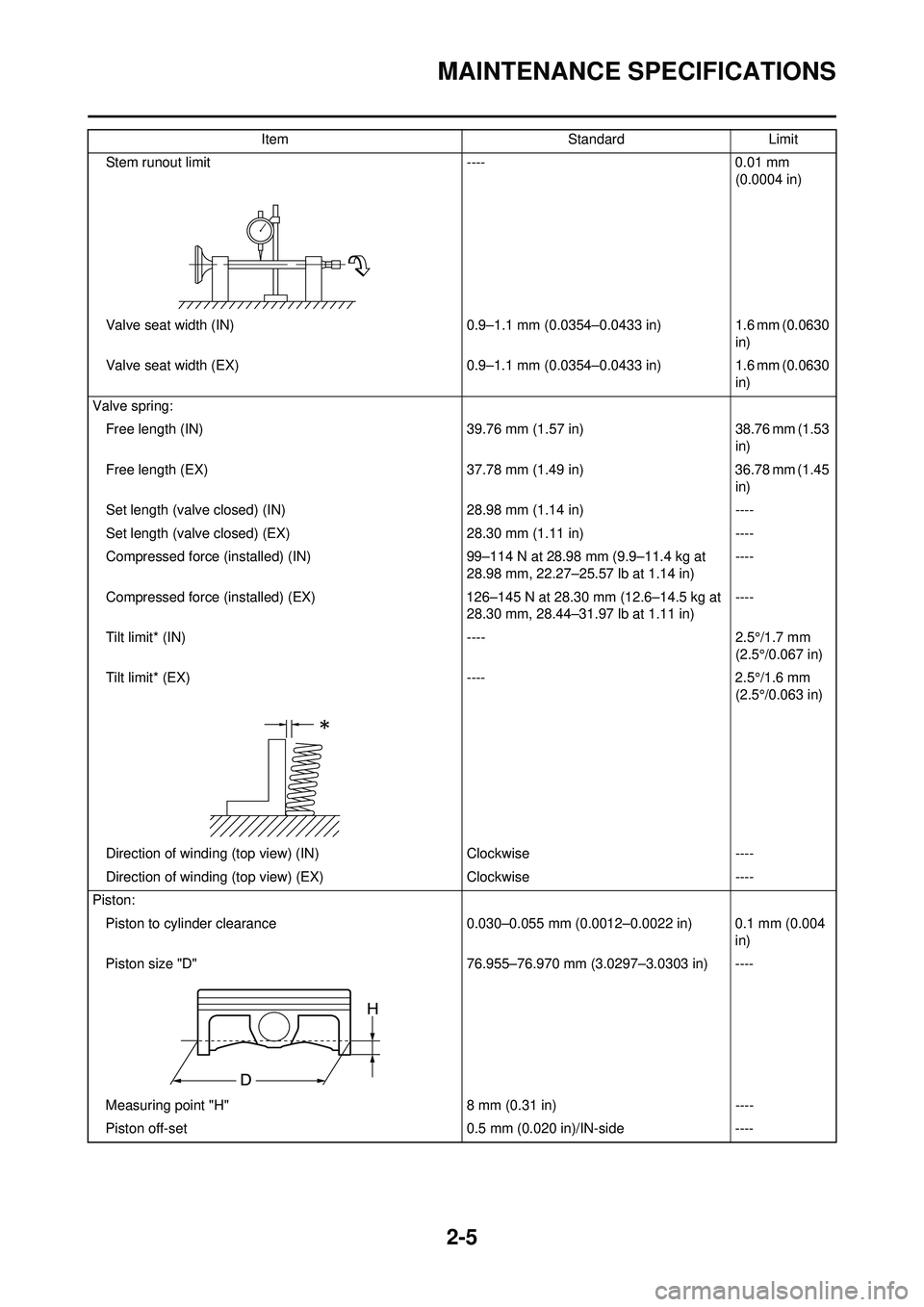
2-5
MAINTENANCE SPECIFICATIONS
Stem runout limit----0.01 mm
(0.0004 in)
Valve seat width (IN) 0.9–1.1 mm (0.0354–0.0433 in) 1.6 mm (0.0630
in)
Valve seat width (EX) 0.9–1.1 mm (0.0354–0.0433 in) 1.6 mm (0.0630
in)
Valve spring: Free length (IN) 39.76 mm (1.57 in)38.76 mm (1.53
in)
Free length (EX) 37.78 mm (1.49 in)36.78 mm (1.45
in)
Set length (valve closed ) (IN) 28.98 mm (1.14 in) ----
Set length (valve closed ) (EX) 28.30 mm (1.11 in) ----
Compressed force (installed) (IN) 99–114 N at 28.98 mm (9.9–11.4 kg at
28.98 mm, 22.27–25.57 lb at 1.14 in) ----
Compressed force (installed) (EX) 126–145 N at 28.30 mm (12.6–14.5 kg at
28.30 mm, 28.44–31.97 lb at 1.11 in) ----
Tilt limit* (IN) ----2.5°/1.7 mm
(2.5°/0.067 in)
Tilt limit* (EX) ----2.5°/1.6 mm
(2.5°/0.063 in)
Direction of winding (top view) (IN) Clockwise----
Direction of winding (top view) (EX) Clockwise----
Piston: Piston to cylinder clearance 0.030–0.055 mm (0.0012–0.0022 in) 0.1 mm (0.004
in)
Piston size "D" 76.955–76.970 mm (3.0297–3.0303 in) ----
Measuring point "H " 8 mm (0.31 in) ----
Piston off-set 0.5 mm (0.020 in)/IN-side----
Item
StandardLimit
Page 32 of 196
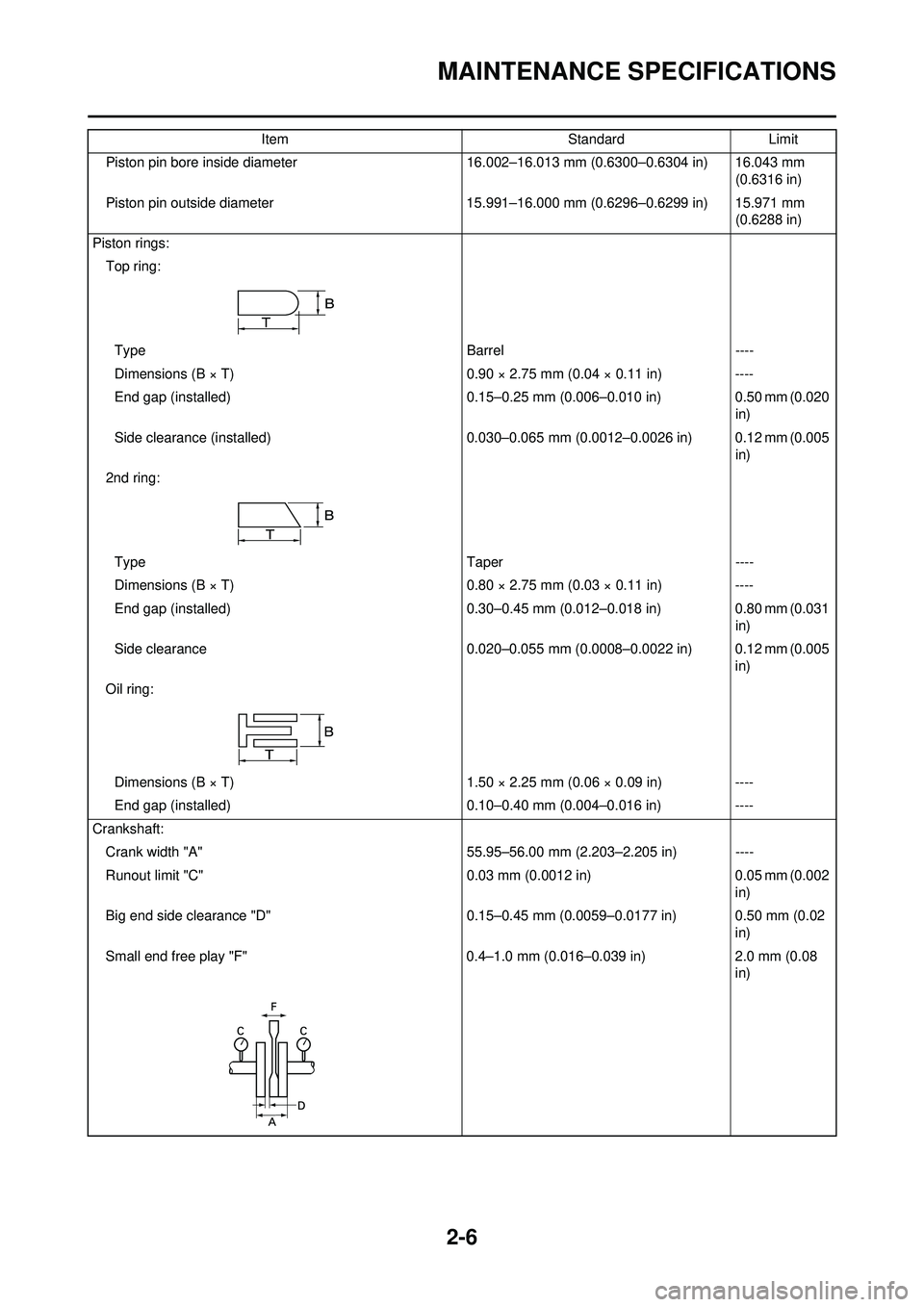
2-6
MAINTENANCE SPECIFICATIONS
Piston pin bore inside diameter16.002–16.013 mm (0.6300–0.6304 in) 16.043 mm
(0.6316 in)
Piston pin outside diameter 15.991–16.000 mm (0.6296–0.6299 in) 15.971 mm
(0.6288 in)
Piston rings: Top ring:
Type Barrel----
Dimensions (B × T) 0.90 × 2.75 mm (0.04 × 0.11 in)----
End gap (installed) 0.15–0.25 mm (0.006–0.010 in) 0.50 mm (0.020
in)
Side clearance (installed) 0.030–0.065 mm (0.0012–0.0026 in) 0.12 mm (0.005
in)
2nd ring:
Type Taper----
Dimensions (B × T) 0.80 × 2.75 mm (0.03 × 0.11 in)----
End gap (installed) 0.30–0.45 mm (0.012–0.018 in) 0.80 mm (0.031
in)
Side clearance 0.020–0.055 mm (0.0008–0.0022 in) 0.12 mm (0.005
in)
Oil ring:
Dimensions (B × T) 1.50 × 2.25 mm (0.06 × 0.09 in)----
End gap (installed) 0.10–0.40 mm (0.004–0.016 in)----
Crankshaft: Crank width "A" 55.95–56.00 mm (2.203–2.205 in) ----
Runout limit "C" 0.03 mm (0.0012 in)0.05 mm (0.002
in)
Big end side clearance "D" 0.15–0.45 mm (0.0059–0.0177 in) 0.50 mm (0.02
in)
Small end free play "F" 0.4–1.0 mm (0.016–0.039 in)2.0 mm (0.08
in)
Item
StandardLimit
Page 34 of 196
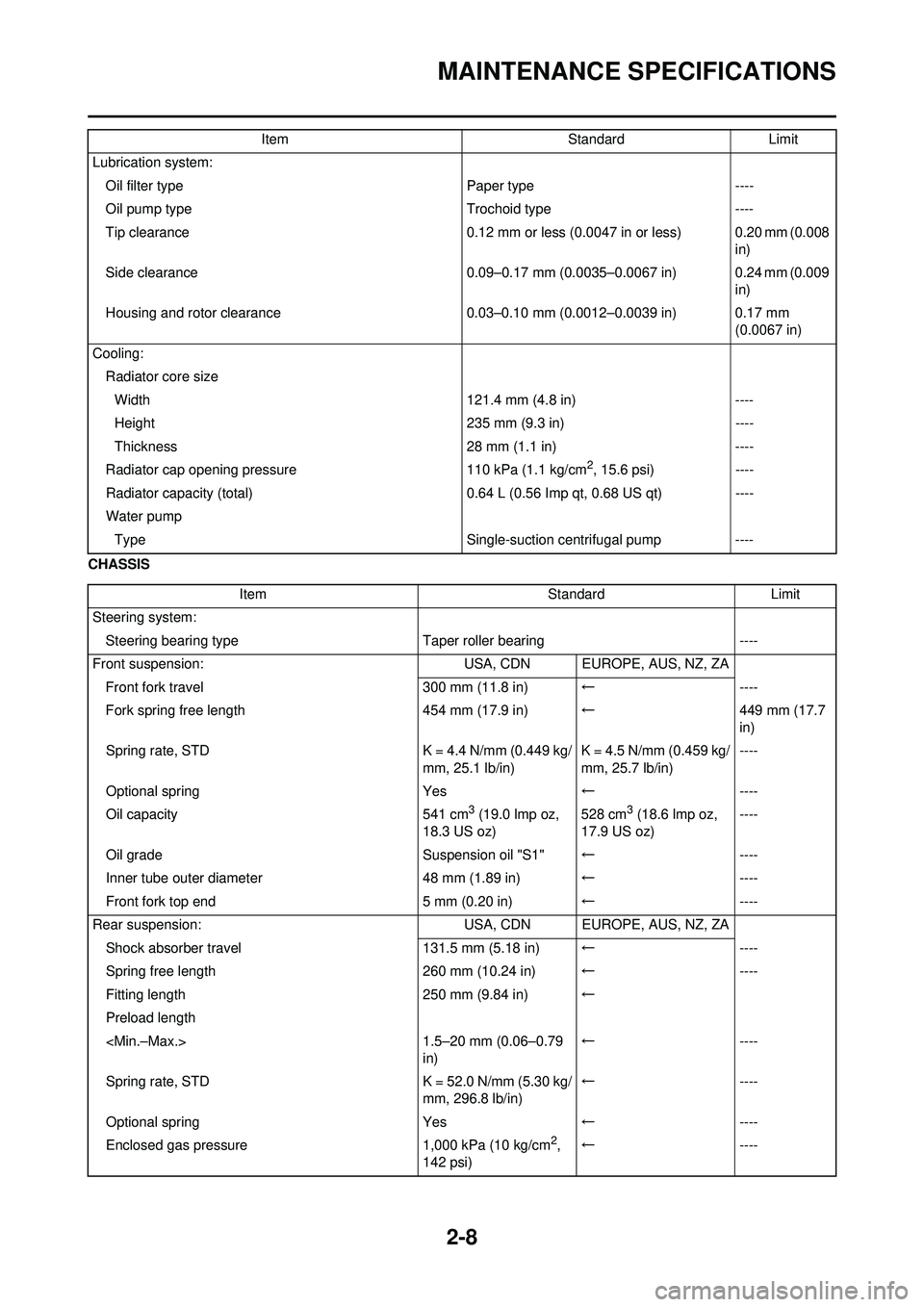
2-8
MAINTENANCE SPECIFICATIONS
CHASSISLubrication system:
Oil filter type Paper type----
Oil pump type Trochoid type----
Tip clearance 0.12 mm or less (0.0047 in or less) 0.20 mm (0.008
in)
Side clearance 0.09–0.17 mm (0.0035–0.0067 in) 0.24 mm (0.009
in)
Housing and rotor clearance 0.03–0.10 mm (0.0012–0.0039 in) 0.17 mm
(0.0067 in)
Cooling: Radiator core sizeWidth 121.4 mm (4.8 in)----
Height 235 mm (9.3 in)----
Thickness 28 mm (1.1 in)----
Radiator cap opening pressure 110 kPa (1.1 kg/cm
2, 15.6 psi)----
Radiator capacity (total) 0.64 L (0.56 Imp qt, 0.68 US qt)----
Water pump Type Single-suction centrifugal pump----
Item
StandardLimit
Item StandardLimit
Steering system: Steering bearing type Taper roller bearing----
Front suspension: USA, CDN EUROPE, AUS, NZ, ZA
Front fork travel 300 mm (11.8 in)←----
Fork spring free length 454 mm (17.9 in)←449 mm (17.7
in)
Spring rate, STD K = 4.4 N/mm (0.449 kg/
mm, 25.1 lb/in) K = 4.5 N/mm (0.459 kg/
mm, 25.7 lb/in)----
Optional spring Yes← ----
Oil capacity 541 cm
3 (19.0 lmp oz,
18.3 US oz) 528 cm3 (18.6 lmp oz,
17.9 US oz) ----
Oil grade Suspension oil "S1"←----
Inner tube outer diameter 48 mm (1.89 in)←----
Front fork top end 5 mm (0.20 in)←----
Rear suspension: USA, CDN EUROPE, AUS, NZ, ZA
Shock absorber travel 131.5 mm (5.18 in)←----
Spring free length 260 mm (10.24 in)←----
Fitting length 250 mm (9.84 in)←
Preload length
in) ←
----
Spring rate, STD K = 52.0 N/mm (5.30 kg/
mm, 296.8 lb/in) ←
----
Optional spring Yes← ----
Enclosed gas pressure 1,000 kPa (10 kg/cm
2,
142 psi) ←
----
Page 91 of 196

4-17
CAMSHAFTS
4. Measure:• Camshaft-to-cap clearanceOut of specification →Measure
camshaft outside diameter.
Measurement steps:
a. Install the camshaft onto the cylin- der head.
b. Position a strip of Plastigauge
®
"1" onto the camshaft.
c. Install the clip, dowel pins and camshaft caps.
• Tighten the bolts (camshaft cap) in a crisscross pattern from innermost
to outer caps.
• Do not turn the camshaft when
measuring clearance with the
Plastigauge
®.
d. Remove the camshaft caps and measure the width of the Plasti-
gauge
® "1".
5. Measure:• Camshaft outside diameter "a"
Out of specification →Replace the
camshaft.
Within specification →Replace
camshaft case and camshaft
caps as a set. CHECKING THE CAMSHAFT
SPROCKET
1. Inspect:
• Camshaft sprocket "1"Wear/damage →Replace the
camshaft assemb ly and timing
chain as a set.
CHECKING THE
DECOMPRESSION SYSTEM
1. Check: • Decompression system
Checking steps:
a. Check that the decompression
mechanism cam "1" moves
smoothly.
b. Check that the decompression
mechanism cam lever pin "2" proj-
ects from the camshaft.
CHECKING THE TIMING CHAIN
TENSIONER
1. Check:• While pressing the tensioner rod lightly with fingers, use a thin
screwdriver "1" and wind the ten-
sioner rod up fully clockwise.
• When releasing the screwdriver
by pressing lightly with fingers,
make sure that the tensioner rod
will come out smoothly.
• If not, replace the tensioner as- sembly. INSTALLING THE CAMSHAFT
1. Install:
• Exhaust camshaft "1"
• Intake camshaft "2"
Installation steps:
a. Turn the crankshaft counterclock- wise with a wrench.
• Apply the molybdenum disulfide oil on the camshafts.
• Apply the engine oil on the decom- pression system.
• Squeezing the decompression le-
ver allows the crankshaft to be
turned easily.
b. Align the T.D.C. mark "a" on the rotor with the align mark "b" on the
crankcase cover when piston is at
T.D.C. on compression stroke.
Camshaft-to-cap clear-
ance:
0.028–0.062 mm
(0.0011–0.0024 in)
in)
Bolt (camshaft cap): 10 Nm (1.0 m•kg, 7.2
ft•lb)
Camshaft outside diame-
ter: 21.959–21.972 mm
(0.8645–0.8650 in)
Page 94 of 196
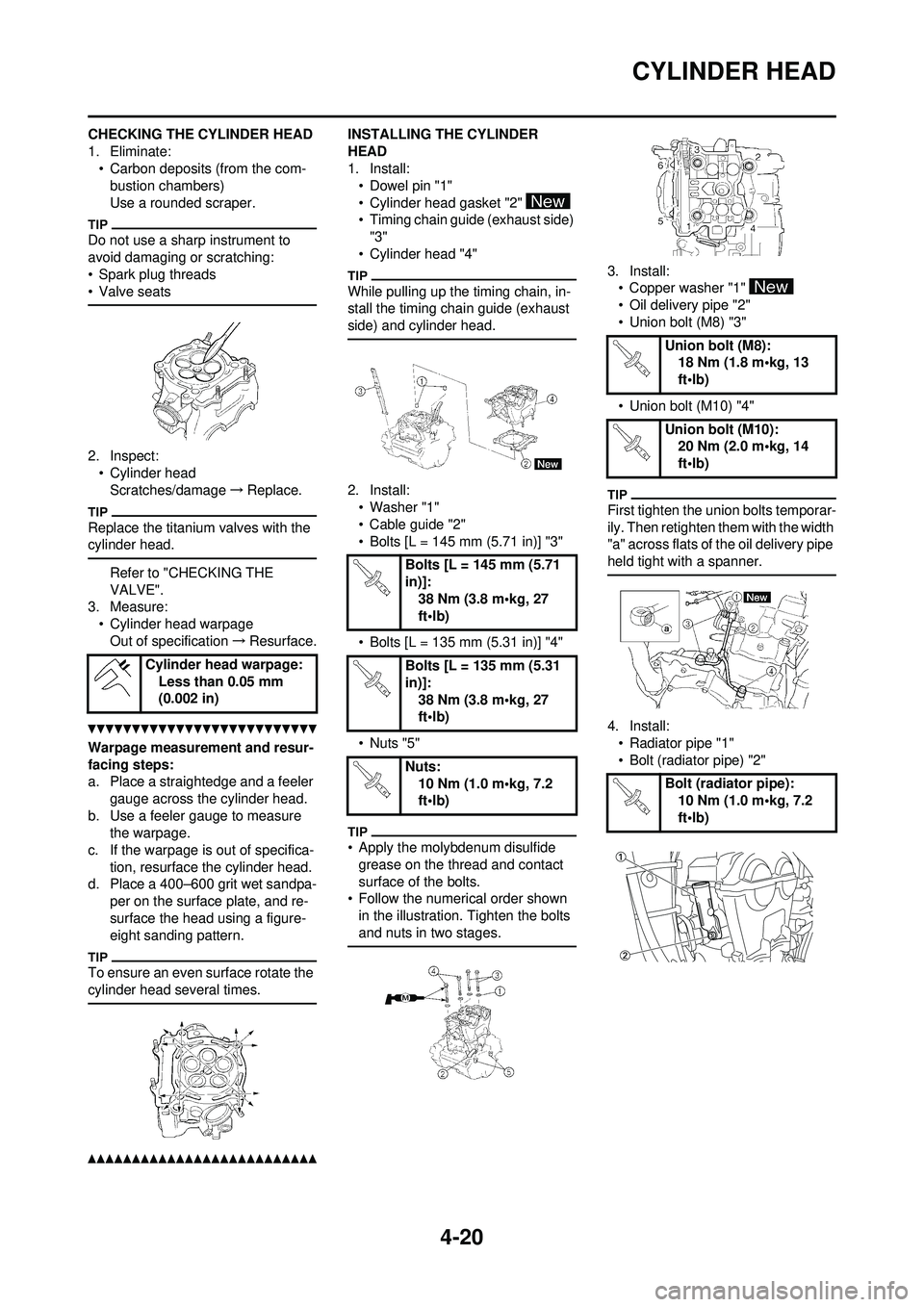
4-20
CYLINDER HEAD
CHECKING THE CYLINDER HEAD
1. Eliminate:• Carbon deposits (from the com-bustion chambers)
Use a rounded scraper.
Do not use a sharp instrument to
avoid damaging or scratching:
• Spark plug threads
• Valve seats
2. Inspect:• Cylinder head
Scratches/damage →Replace.
Replace the titanium valves with the
cylinder head.
Refer to "CHECKING THE
VALVE".
3. Measure:
• Cylinder head warpageOut of specification →Resurface.
Warpage measurement and resur-
facing steps:
a. Place a straightedge and a feeler
gauge across the cylinder head.
b. Use a feeler gauge to measure the warpage.
c. If the warpage is out of specifica- tion, resurface the cylinder head.
d. Place a 400–600 grit wet sandpa-
per on the surface plate, and re-
surface the head using a figure-
eight sanding pattern.
To ensure an even surface rotate the
cylinder head several times.
INSTALLING THE CYLINDER
HEAD
1. Install:• Dowel pin "1"
• Cylinder head gasket "2"
• Timing chain guide (exhaust side) "3"
• Cylinder head "4"
While pulling up the timing chain, in-
stall the timing chain guide (exhaust
side) and cylinder head.
2. Install: • Washer "1"
• Cable guide "2"
• Bolts [L = 145 mm (5.71 in)] "3"
• Bolts [L = 135 mm (5.31 in)] "4"
•Nuts "5"
• Apply the molybdenum disulfide
grease on the thread and contact
surface of the bolts.
• Follow the numerical order shown
in the illustration. Tighten the bolts
and nuts in two stages.
3. Install:• Copper washer "1"
• Oil delivery pipe "2"
• Union bolt (M8) "3"
• Union bolt (M10) "4"
First tighten the union bolts temporar-
ily. Then retighten them with the width
"a" across flats of the oil delivery pipe
held tight with a spanner.
4. Install:
• Radiator pipe "1"
• Bolt (radiator pipe) "2"
Cylinder head warpage:
Less than 0.05 mm
(0.002 in)
Bolts [L = 145 mm (5.71
in)]:38 Nm (3.8 m•kg, 27
ft•lb)
Bolts [L = 135 mm (5.31
in)]: 38 Nm (3.8 m•kg, 27
ft•lb)
Nuts: 10 Nm (1.0 m•kg, 7.2
ft•lb)
Union bolt (M8): 18 Nm (1.8 m•kg, 13
ft•lb)
Union bolt (M10): 20 Nm (2.0 m•kg, 14
ft•lb)
Bolt (radiator pipe): 10 Nm (1.0 m•kg, 7.2
ft•lb)
Page 96 of 196
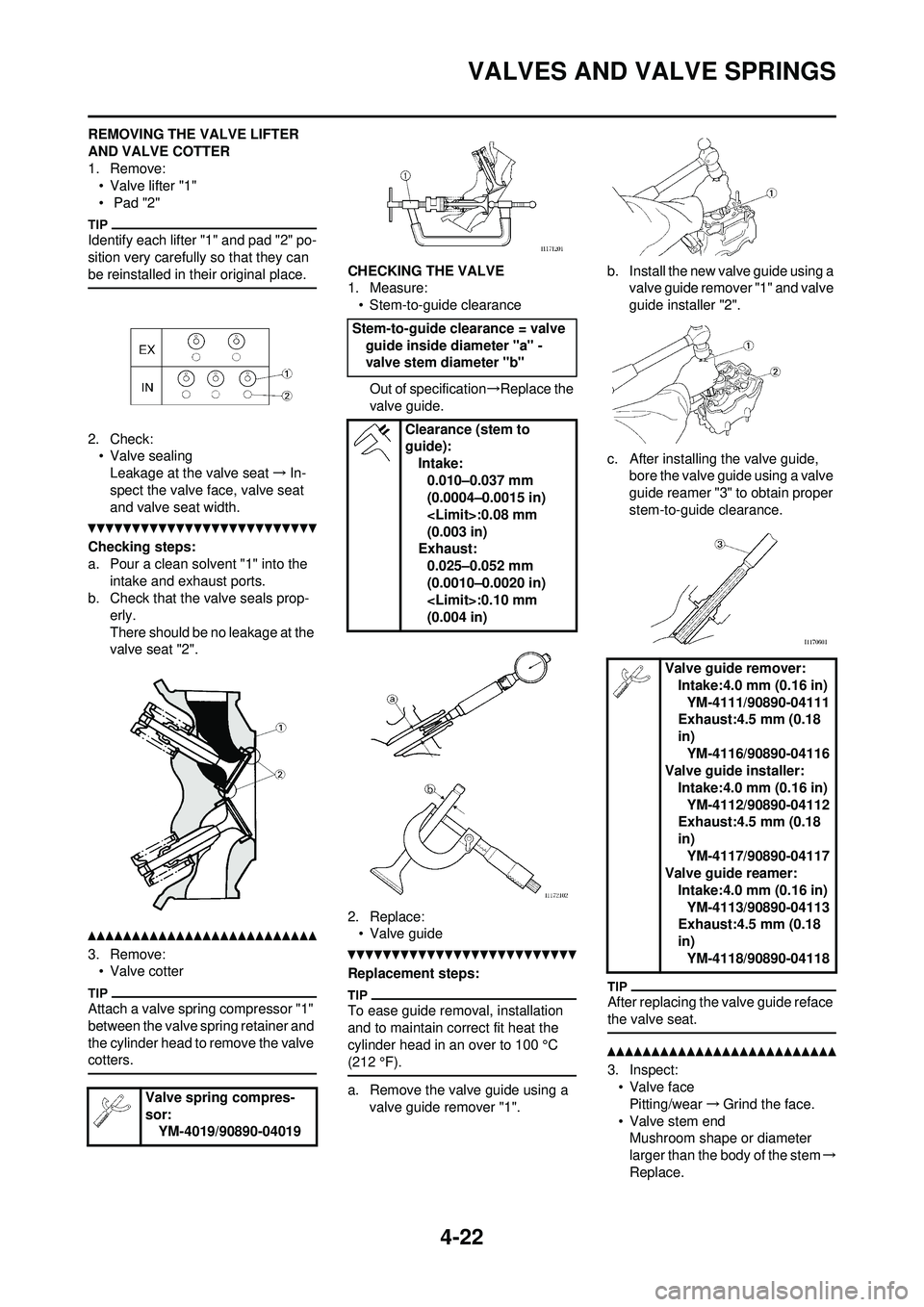
4-22
VALVES AND VALVE SPRINGS
REMOVING THE VALVE LIFTER
AND VALVE COTTER
1. Remove:• Valve lifter "1"
• Pad "2"
Identify each lifter "1" and pad "2" po-
sition very carefully so that they can
be reinstalled in their original place.
2. Check:• Valve sealingLeakage at the valve seat →In-
spect the valve face, valve seat
and valve seat width.
Checking steps:
a. Pour a clean solvent "1" into the intake and exhaust ports.
b. Check that the valve seals prop- erly.
There should be no leakage at the
valve seat "2".
3. Remove:• Valve cotter
Attach a valve spring compressor "1"
between the valve spring retainer and
the cylinder head to remove the valve
cotters.
CHECKING THE VALVE
1. Measure:
• Stem-to-guide clearance
Out of specification →Replace the
valve guide.
2. Replace: • Valve guide
Replacement steps:
To ease guide removal, installation
and to maintain correct fit heat the
cylinder head in an over to 100 °C
(212 °F).
a. Remove the valve guide using a valve guide remover "1". b. Install the new valve guide using a
valve guide remover "1" and valve
guide installer "2".
c. After installing the valve guide, bore the valve guide using a valve
guide reamer "3" to obtain proper
stem-to-guide clearance.
After replacing the valve guide reface
the valve seat.
3. Inspect:• Valve face
Pitting/wear →Grind the face.
• Valve stem end Mushroom shape or diameter
larger than the body of the stem →
Replace.
Valve spring compres-
sor:
YM-4019/90890-04019
Stem-to-guide clearance = valve guide inside diameter "a" -
valve stem diameter "b"
Clearance (stem to
guide):Intake:0.010–0.037 mm
(0.0004–0.0015 in)
(0.003 in)
Exhaust:
0.025–0.052 mm
(0.0010–0.0020 in)
(0.004 in)
Valve guide remover: Intake:4.0 mm (0.16 in)
YM-4111/90890-04111
Exhaust:4.5 mm (0.18
in)
YM-4116/90890-04116
Valve guide installer: Intake:4.0 mm (0.16 in)
YM-4112/90890-04112
Exhaust:4.5 mm (0.18
in)
YM-4117/90890-04117
Valve guide reamer: Intake:4.0 mm (0.16 in)
YM-4113/90890-04113
Exhaust:4.5 mm (0.18
in)
YM-4118/90890-04118
Page 97 of 196
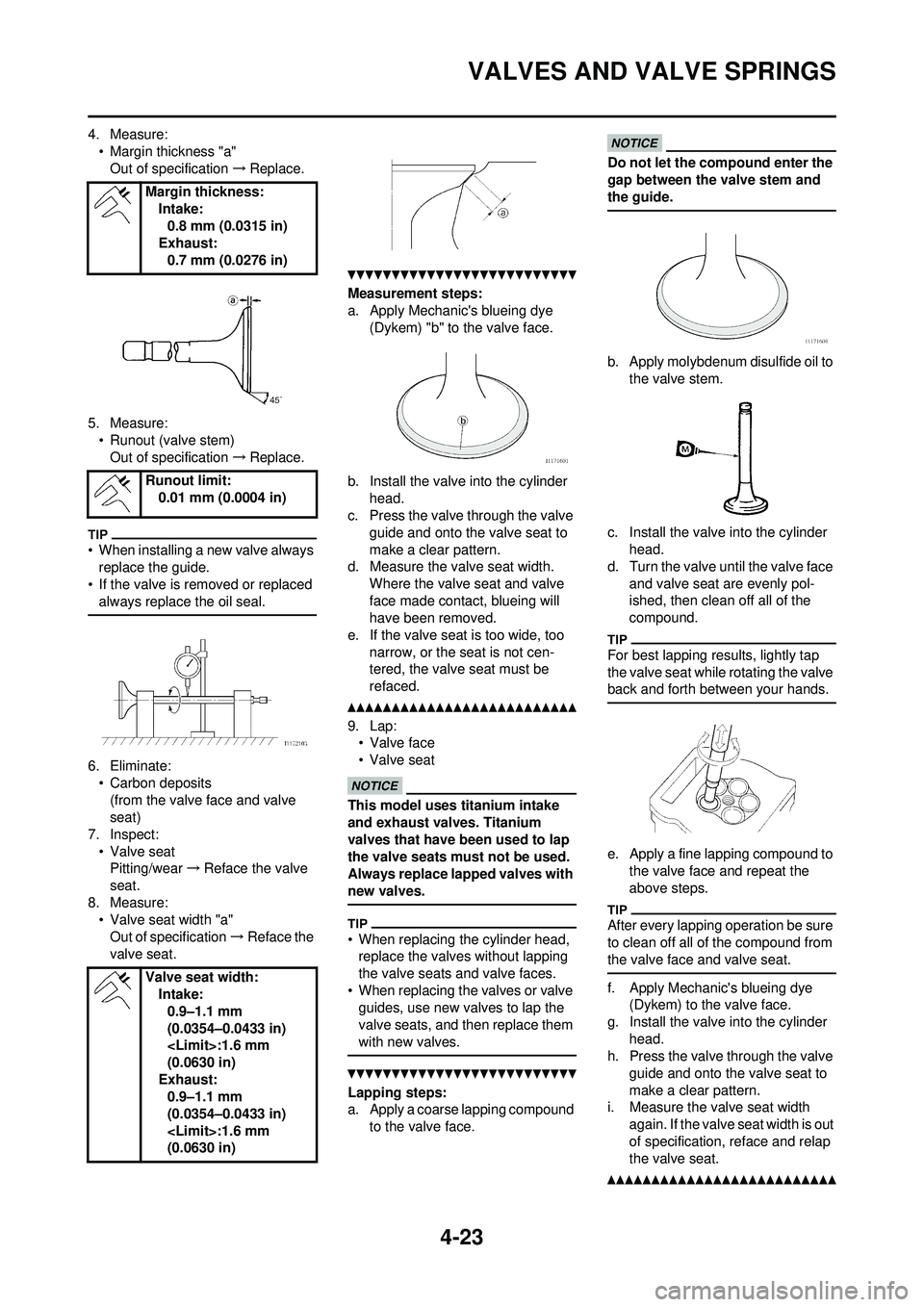
4-23
VALVES AND VALVE SPRINGS
4. Measure:• Margin thickness "a"Out of specification →Replace.
5. Measure: • Runout (valve stem)Out of specification →Replace.
• When installing a new valve always
replace the guide.
• If the valve is removed or replaced
always replace the oil seal.
6. Eliminate:• Carbon deposits(from the valve face and valve
seat)
7. Inspect: • Valve seatPitting/wear →Reface the valve
seat.
8. Measure: • Valve seat width "a"
Out of specification →Reface the
valve seat.
Measurement steps:
a. Apply Mechanic's blueing dye (Dykem) "b" to the valve face.
b. Install the valve into the cylinder head.
c. Press the valve through the valve guide and onto the valve seat to
make a clear pattern.
d. Measure the valve seat width. Where the valve seat and valve
face made contact, blueing will
have been removed.
e. If the valve seat is too wide, too
narrow, or the seat is not cen-
tered, the valve seat must be
refaced.
9. Lap: • Valve face
• Valve seat
This model uses titanium intake
and exhaust valves. Titanium
valves that have been used to lap
the valve seats must not be used.
Always replace lapped valves with
new valves.
• When replacing the cylinder head, replace the valves without lapping
the valve seats and valve faces.
• When replacing the valves or valve guides, use new valves to lap the
valve seats, and then replace them
with new valves.
Lapping steps:
a. Apply a coarse lapping compound
to the valve face.
Do not let the co mpound enter the
gap between the valve stem and
the guide.
b. Apply molybdenum disulfide oil to the valve stem.
c. Install the valve into the cylinder head.
d. Turn the valve until the valve face
and valve seat are evenly pol-
ished, then clean off all of the
compound.
For best lapping results, lightly tap
the valve seat while rotating the valve
back and forth between your hands.
e. Apply a fine lapping compound to the valve face and repeat the
above steps.
After every lapping operation be sure
to clean off all of the compound from
the valve face and valve seat.
f. Apply Mechanic's blueing dye (Dykem) to the valve face.
g. Install the valve into the cylinder
head.
h. Press the valve through the valve guide and onto the valve seat to
make a clear pattern.
i. Measure the valve seat width again. If the valve seat width is out
of specification, reface and relap
the valve seat.
Margin thickness:Intake:
0.8 mm (0.0315 in)
Exhaust: 0.7 mm (0.0276 in)
Runout limit: 0.01 mm (0.0004 in)
Valve seat width: Intake:
0.9–1.1 mm
(0.0354–0.0433 in)
(0.0630 in)
Exhaust: 0.9–1.1 mm
(0.0354–0.0433 in)
(0.0630 in)
Page 109 of 196
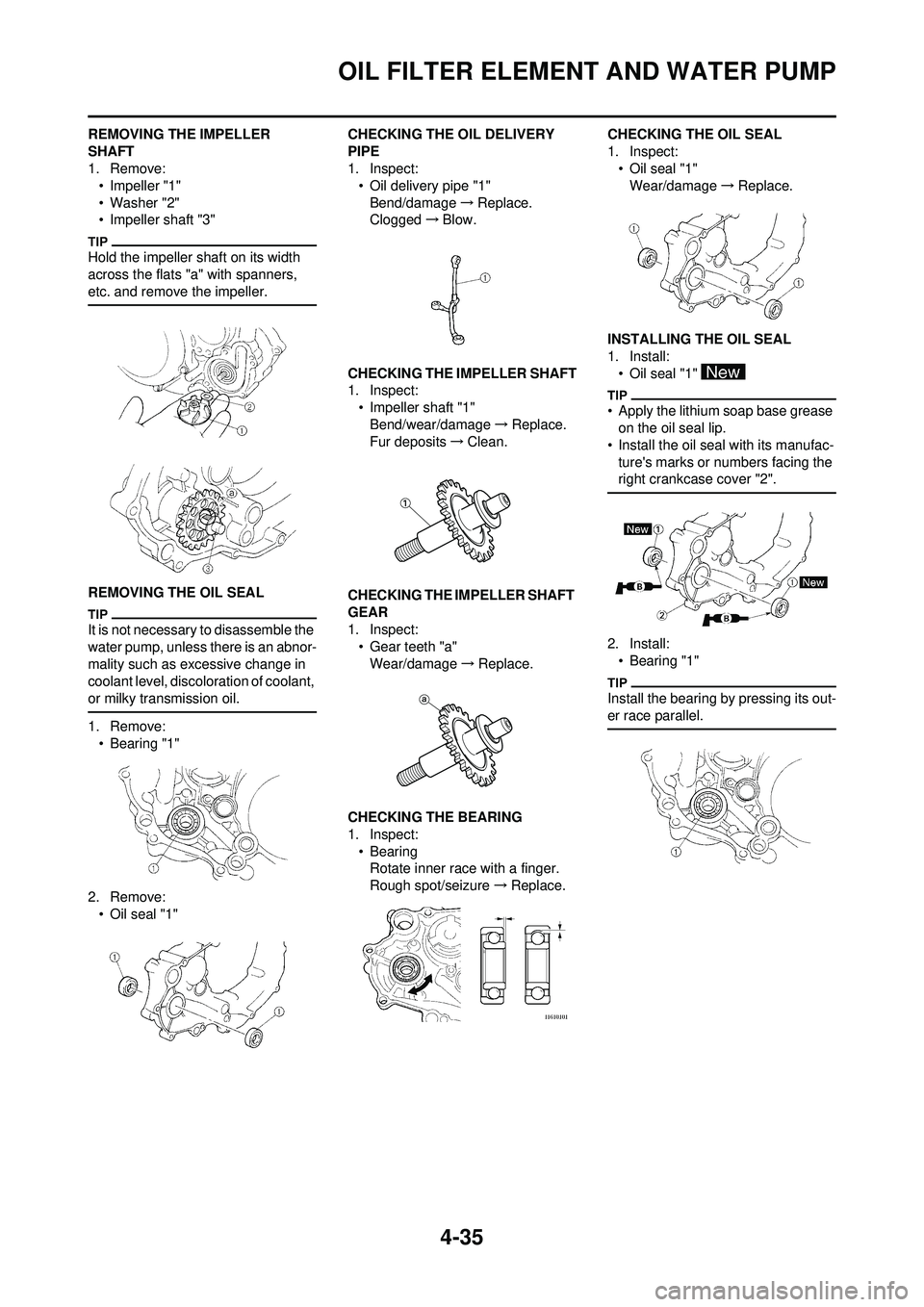
4-35
OIL FILTER ELEMENT AND WATER PUMP
REMOVING THE IMPELLER
SHAFT
1. Remove:• Impeller "1"
• Washer "2"
• Impeller shaft "3"
Hold the impeller shaft on its width
across the flats "a" with spanners,
etc. and remove the impeller.
REMOVING THE OIL SEAL
It is not necessary to disassemble the
water pump, unless there is an abnor-
mality such as excessive change in
coolant level, discoloration of coolant,
or milky transmission oil.
1. Remove:• Bearing "1"
2. Remove: • Oil seal "1" CHECKING THE OIL DELIVERY
PIPE
1. Inspect:
• Oil delivery pipe "1"
Bend/damage →Replace.
Clogged →Blow.
CHECKING THE IMPELLER SHAFT
1. Inspect: • Impeller shaft "1"Bend/wear/damage →Replace.
Fur deposits →Clean.
CHECKING THE IMPELLER SHAFT
GEAR
1. Inspect: • Gear teeth "a"Wear/damage →Replace.
CHECKING THE BEARING
1. Inspect: •BearingRotate inner race with a finger.
Rough spot/seizure →Replace. CHECKING THE OIL SEAL
1. Inspect:
• Oil seal "1"Wear/damage →Replace.
INSTALLING THE OIL SEAL
1. Install: • Oil seal "1"
• Apply the lithium soap base grease on the oil seal lip.
• Install the oil seal with its manufac- ture's marks or numbers facing the
right crankcase cover "2".
2. Install:• Bearing "1"
Install the bearing by pressing its out-
er race parallel.